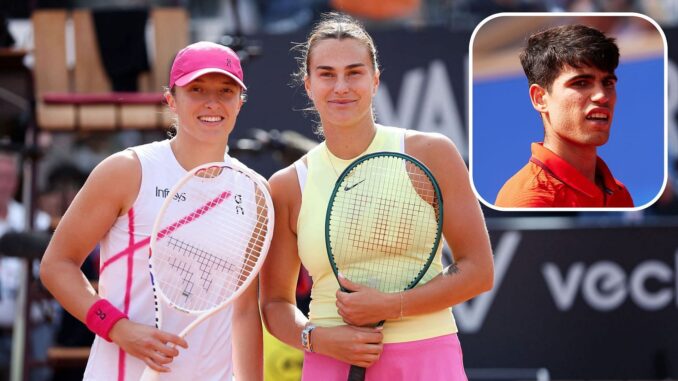
The 2025 French Open has been a showcase of breathtaking tennis, but as the tournament reaches its climactic stages, a scheduling controversy has ignited fierce debate among fans. The decision to slot Carlos Alcaraz’s quarterfinal against Tommy Paul into the coveted night session on Court Philippe-Chatrier, while relegating the women’s blockbuster semifinal between Iga Swiatek and Aryna Sabalenka to an earlier slot, has left spectators and players alike crying foul. Alcaraz’s swift 6-0, 6-1, 6-4 rout of an injury-hampered Paul, which lasted just 94 minutes, was labeled “uncompetitive” by fans, who took to social media to vent their frustration. “This is just ridiculous,” one fan posted, capturing the sentiment of many who believe the tournament’s scheduling continues to undervalue women’s tennis.
The night session, starting after 8:15 p.m. local time, is the French Open’s marquee slot, drawing massive crowds and global viewership. Yet, no women’s match has been featured in this primetime window throughout the 2025 tournament, a stark contrast to the men’s matches that have dominated the evening spotlight. Swiatek, the four-time champion chasing a historic fifth title, and Sabalenka, the world No. 1 seeking her first Roland Garros crown, delivered compelling quarterfinal performances that outlasted Alcaraz’s match in both duration and drama. Sabalenka’s 7-6(3), 6-3 victory over Olympic gold medalist Zheng Qinwen clocked in at one hour and 57 minutes, while Swiatek’s 6-1, 7-5 win against Elina Svitolina lasted one hour and 41 minutes. “Everyone who follows tennis knew that tonight would be uncompetitive,” tennis insider Bastien Fachan remarked, criticizing the choice to prioritize Alcaraz’s match over the women’s clashes.
Fans argue that the Swiatek-Sabalenka semifinal, a clash between two titans with a rivalry that has defined the WTA Tour, deserved the night session’s prestige. “4x Champion French Open champion and @rolandgarros couldn’t put Iga on a night session. That does not make sense,” one fan lamented, while another questioned, “So has there not been a single women’s match in the night session the whole tournament?!” The scheduling snub is particularly galling given the history of the Swiatek-Sabalenka rivalry, with Swiatek leading 8-4 overall and 5-1 on clay. “It is always a challenge against Aryna,” Swiatek said, recalling their thrilling Madrid final in 2023, which she described as “one of the best and most exciting finals that I have played.” Sabalenka, undeterred by her underdog status on clay, expressed her determination: “I’m super excited to go out there and to fight and to do everything I need to get the win.”
The controversy isn’t new. Since night sessions were introduced at Roland Garros in 2021, only four women’s matches have been featured in this slot, with none this year. Sabalenka has been vocal about the imbalance, advocating for equal treatment. “There were a lot of great battles, a lot of great matches which would be cool to see as a night session, just so more people understand watching,” she said, emphasizing the need to showcase women’s tennis to a broader audience. Swiatek echoed this sentiment, pointing to the entertainment value of women’s matches. “Women’s matches can be entertainment the same way,” she said after her win over Jaqueline Cristian, gesturing to the Mexican waves that energized the crowd on Court Suzanne Lenglen.
Tournament director Amélie Mauresmo, a former world No. 1, has faced mounting criticism for the scheduling decisions. While some defend the prioritization of men’s matches due to their perceived business value, others see it as a gender bias that undermines the women’s game. “I’m beyond disappointed she has not done anything to change this,” one fan said of Mauresmo, a former French Open semifinalist. Players like Ons Jabeur and Jessica Pegula have also condemned the disparity, amplifying calls for change.
As Swiatek and Sabalenka prepare for their Thursday showdown, with Swiatek’s 26-match Roland Garros win streak on the line and Sabalenka’s 25 aces and relentless baseline aggression posing a threat, fans are left wondering why such a pivotal match isn’t getting the spotlight it deserves. The debate has sparked a broader conversation about equity in tennis, with the Parisian crowd eager for a resolution that honors the sport’s biggest stars, regardless of gender. For now, Swiatek and Sabalenka will let their rackets do the talking, but the scheduling saga ensures their battle will carry even greater weight.
Leave a Reply